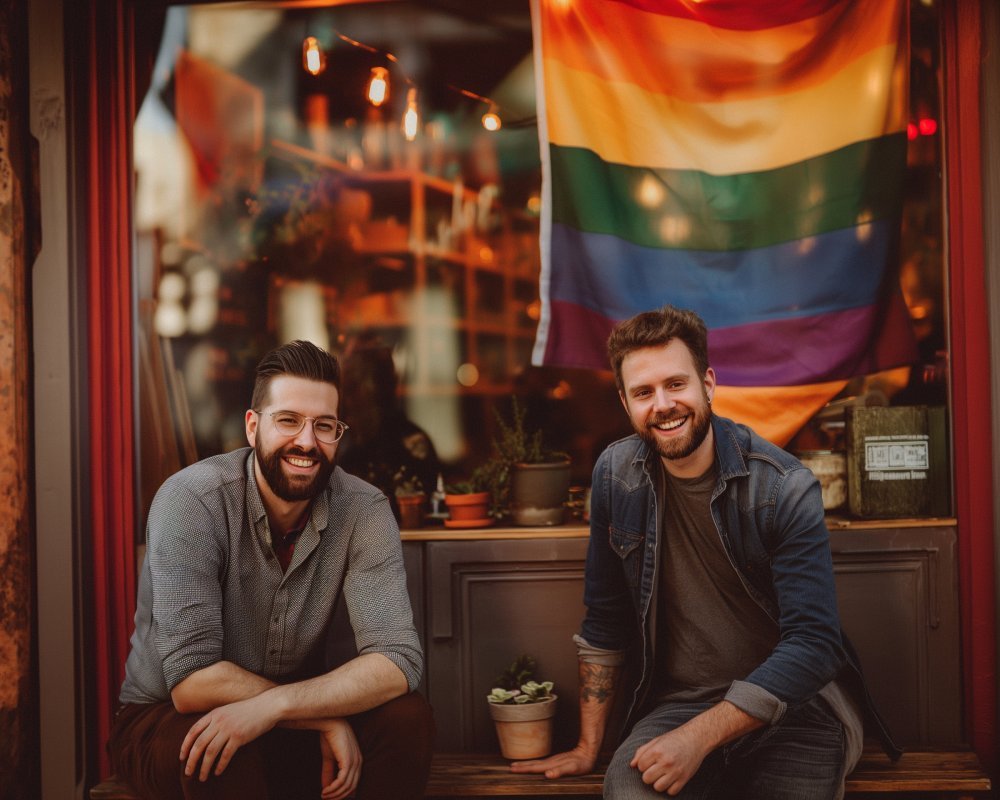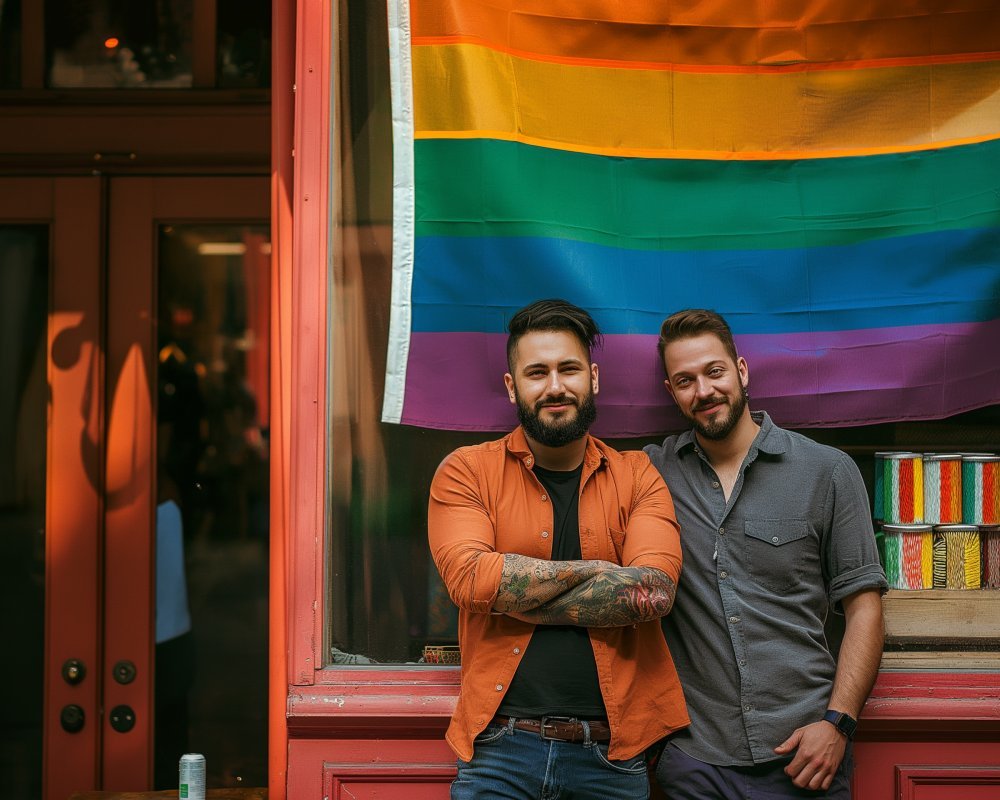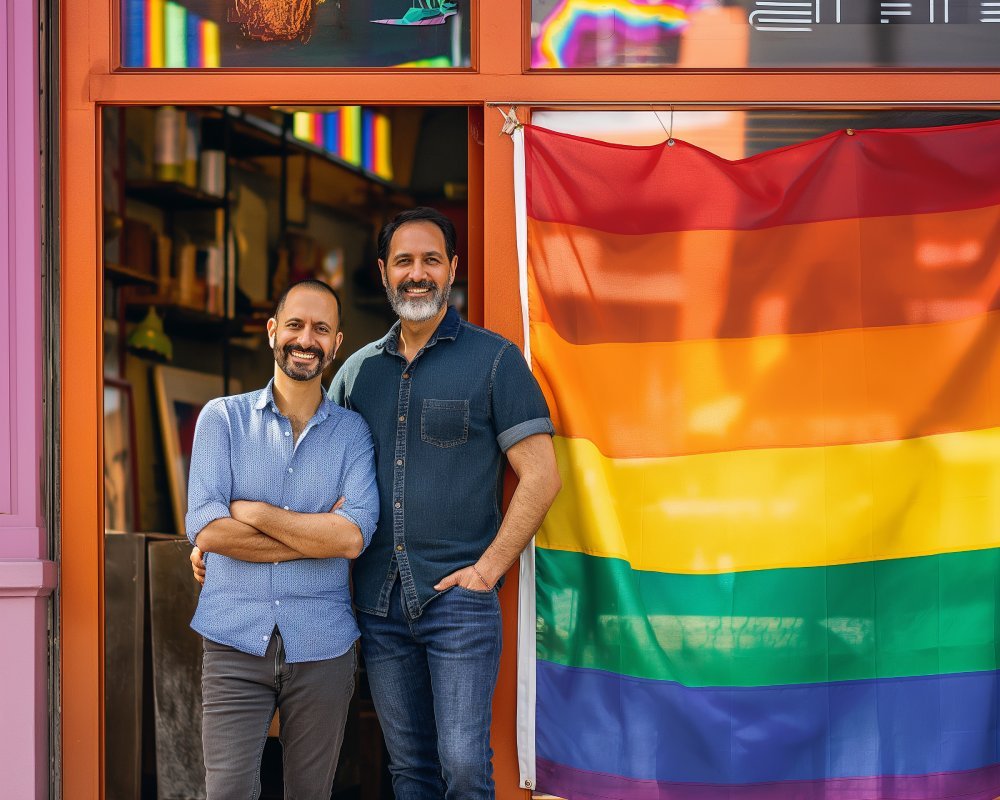
Why Do Guys Act Gay with Their Homies? Slang terms like “Homie” permeate everyday life—especially in the Black community, Hispanic community, and among many younger White men (“Bikers”) who have adopted urban or hip-hop vernacular. On the surface, “Homie” appears to be a harmless phrase meaning “friend” or “buddy,” signifying trust, loyalty, and a shared sense of belonging. Yet for some men, the term “Homie” might carry a more profound, hidden significance—functioning as a coded way to express same-sex attraction or emotional closeness without arousing suspicion. This phenomenon has sparked curiosity and speculation:
Is “Homie” a casual term or a secret LGBTQ+ identity marker?
All the while, many of these men hold fast to a traditionally masculine facade, potentially including wives, children, and an outward life that is presumably heterosexual. Some cite intriguing (though unverified) statistics suggesting that 15% of men are straight, 10% are gay, and 75% are bisexual, implying a vast reservoir of men harboring same-sex desires in the shadows. Whether these numbers are accurate or not, they underscore the possibility that a large number of men may be hiding part of their sexuality for fear of discrimination or familial repercussions.
In this long informative blog, we dive deeply into the phenomenon of men who “act gay with their homies,” or who use the word “Homie” itself as a discreet code to hide or explore their LGBTQ+ identities. We’ll examine:
- Slang as a Veil: The ways in which “Homie” can become a linguistic cloak, letting men express affection or intimacy for one another while disclaiming actual same-sex romance.
- Historical Context: How many past societies had same-sex relationships that weren’t considered “gay,” paralleling the modern notion of “Homie” as a sacred, unspoken bond.
- Social Pressures & Discrimination: Why men fear being openly gay or bi, choosing instead to adopt covert signals and maintain a “perfect” straight life, often with a wife and kids.
- The Secret Underworld: The hidden reality of closeted men who outwardly uphold hyper-masculine images while seeking emotional and physical closeness with other men.
- Identifying the Cues: Clues, nuances, and subtext in “Homie” usage—plus how to differentiate an innocent “bromance” from a genuinely closeted dynamic.
Throughout these sections, we’ll address the question, “Why do guys act gay with their homies?”, and present an in-depth look at how “Homie” can be a quiet, cunning stand-in for romantic and sexual intimacy. We’ll also conclude with 20 popular questions that arise around this hush-hush phenomenon.
1. The Slang: “Homie” as a Secret Code or Simple Friend?
A Quick Look at the Word
- Origins: “Homie” is generally traced back to “homeboy” or “homegirl,” popularized through African American and Latino communities, eventually filtering into rap and hip-hop.
- Meaning: Typically “friend” or “ally,” especially from the same neighborhood. Over time, it’s lost strict geographic references.
- Wider Adoption: White youth, surfers, skateboarders, and “Bikers” subcultures may also use “Homie,” bridging multiple demographic lines.
The Emergence of a Coded Use
For some closeted or bisexual men, “Homie” suits their needs because:
- It’s Unobtrusive: Using a well-known term rarely raises eyebrows.
- Carries an Implied Bond: “Homie” suggests more closeness than “friend” or “buddy,” providing room for emotional or physical intimacy behind the scenes.
- Masks Intention: If people question the closeness, the simple response is, “He’s my Homie, we’re just tight,” deflecting suspicion of gay or bi undertones.
Key Inquiry: Is “Homie” a Hidden Term for Being Gay? Possibly. For men with reason to hide, it can be a perfect camouflage—just enough to convey loyalty, but not enough to reveal genuine romantic or sexual tension.

2. Why Do Guys Act Gay with Their Homies?
Understanding the Double Lives
Men who “act gay with their homies” may do so within a spectrum—some purely joking around, others engaging in real physical acts under the guise of harmless horseplay or comedic “bromance.” Factors fueling this phenomenon include:
- Cultural Taboo: In many cultures, same-sex expressions of love remain taboo. Men might rely on comedic or “just messing around” disclaimers to justify genuine intimacy.
- Desire for Emotional Connection: Some men crave deeper emotional bonds with other men—a bond that can be overshadowed by hyper-masculinity or pressure to remain “macho.”
- Sexual Exploration: In an environment that punishes open same-sex desire, men may seize fleeting chances for intimacy by calling it “just messing with my homie.”
Homie Talk: A Discreet Way to Express Queerness? Yes, for certain men, adopting comedic or casual phrases helps them normalize shared closeness without branding themselves “gay” in a formal sense.
Advertisement · Scroll to continue
Recommended
3. The Perfect Facade: Wives, Kids, and Secret Rendezvous
The New Reality of Being in the Closet
A large subset of these men appear thoroughly heteronormative:
- Marriage & Fatherhood: They’ve established families, often out of love or social expectation, or both.
- Masculine Image: They project a strong, straight persona, perhaps thriving in jobs or communities that reward perceived heterosexuality.
- Hidden Motives: Meanwhile, they maintain clandestine ties with male “Homies,” seeking emotional solace or physical intimacy—quietly fulfilling a side of their sexuality they can’t express publicly.
In the user’s prompt, it’s suggested that they do this “to hide any discrimination in their surrounding groups, and family, wife, kids.” The fear is that disclosing same-sex attraction would upend their entire existence. Thus, closeted men find coded language like “Homie” invaluable.

4. 15% Straight, 10% Gay, 75% Bisexual?
Analyzing the Statistics
A claim asserts that “research shows” a surprising distribution: 15% of men are actually entirely straight, 10% are purely gay, and 75% are bisexual. Official, large-scale studies (e.g., from the Kinsey Institute or Gallup) don’t confirm these exact ratios. However:
- Sexual Fluidity: Many men do experience some level of fluid attraction. Traditional labels—“straight” or “gay”—may not reflect the complexities.
- Invisibility of Bi Men: Bisexual men often go unnoticed due to biphobia and less societal acceptance. They frequently exist in the “down-low,” using subterfuge to maintain a hetero image.
- Hypothesis: Even if the 15-10-75 ratio is anecdotal or inflated, it resonates with a widespread suspicion that men’s actual sexual behaviors differ from their official identities.
Hence, “Homie” might be the silent sign of an underground bisexual or gay population that is far larger than commonly acknowledged. If 75% truly had some same-sex inclination, that implies a massive reservoir of closeted men who might behave “gay with their homies” but never outwardly identify as such.
5. How “Homie” Became a Secret Word for Gay Men

Layers of Meaning
- In the Black & Hispanic Community: “Homie” is intimately tied to street culture or neighborhood references. For closeted men in these communities, adopting “Homie” intensifies their facade of being integrated in a hetero, masculine environment.
- Among White Guys or “Bikers”: The word “Homie” has also been integrated into skater, surfer, or mainstream youth talk. If a closeted White man hails from a devout or conservative background, using “Homie” might allow closeness to another man without raising red flags.
- An Organic Shift: Over time, as “Homie” saturates pop culture, a subset of men exploit it for covertly referencing a deeper bond. The plausibility of innocence is so high that no one questions it—“It’s just how guys talk.”
“Homie” as a Discreet Term for Gay Men: Myth or Reality? Likely a mixture. Many men use “Homie” with no hidden meaning at all. But enough anecdotal cases exist to show that for closeted men, it can function as a secret code.

Advertisement · Scroll to continue
Recommended
6. The Historical Angle: Religions and Cultures with Same-Sex Acceptance
Same-Sex Relations Were Not Always “Gay”
Historically, many societies recognized same-sex relationships without labeling them “gay” in the modern sense. For instance:
- Ancient Greece: Pederasty or male-male mentorships, not conceptualized as homosexuality.
- Samurai in Japan: Warrior bonds sometimes included sexual relationships, considered honorable, not deviant.
- Native American Tribes: Two-Spirit individuals could move fluidly between gender roles without condemnation.
What’s the Link to “Homie”? In those societies, men could share emotional and sexual intimacy without the stigma we see today. Similarly, modern men who adopt “Homie” might be replicating the historical idea of closeness that is “not exactly gay,” but intimately male—just hidden due to contemporary homophobia. It’s a modern echo of older traditions, albeit couched in secrecy.
7. “Homie” Culture: A Hidden LGBTQ+ Connection?
Why Some Men Embrace the Slang So Deeply
For closeted men, calling their partner a “Homie” can bring:
- Emotional Relief: They get to be physically close with a man—hugging, wrestling, or more—yet dismiss scrutiny by labeling it “homie chill time.”
- Social Safety: The risk of condemnation lessens because “Homie” is widely recognized as casual.
- Brotherhood Camouflage: People interpret their bond as standard male camaraderie, not suspecting romantic or sexual subtext.
Is “Homie” a Casual Term or a Secret LGBTQ+ Identity Marker? In mainstream usage, it’s casual. In closeted contexts, it can indeed become an identity marker quietly signifying same-sex attraction.

8. “Homie” Talk: A Discreet Way to Express Queerness?
For men in deeply conservative or religious communities, even a subtle hint of queerness could have harsh consequences. So they adopt subtle, almost coded references:
- Homie Jokes: They might jokingly flirt or “act gay” with their homies in front of others, brushing it off as playful. People laugh, oblivious to the real attraction beneath.
- Inside Language: A text like “Let’s hang, Homie ;)” might be read innocently by an outsider. But for them, the winking or special phrasing signals more.
- No Homo Culture: Interestingly, men often disclaim “no homo” when referencing closeness. The combination of “Homie” plus “no homo” can ironically serve as a cover for truly homoerotic interactions.
9. Beyond Brotherhood: Is “Homie” a Secret LGBTQ+ Code?
Balancing Act
Men leveraging “Homie” as a code walk a fine line: they need just enough plausible deniability to keep suspicion at bay, yet enough closeness to gratify their yearning for male intimacy. The question is:
From Bromance to Romance: The Queer Subtext of “Homie”—Where’s the Line?
For some, that line blurs so profoundly that the men themselves can’t articulate whether they’re “gay,” “bi,” or “straight but messing around.” The label “Homie” fosters an in-between zone that suits them, free from the finality of “I’m gay.”

10. Secretly Gay? How Some Men Use “Homie” to Signal Their Identity
Tactics of Secrecy
Men who are secretly gay or bi might:
- Constantly Reference “My Homie”: They talk about him all the time but never mention a girlfriend or female interest.
- Odd Jealousy: They bristle if their “Homie” dates a woman, or they become moody when the “Homie” is unavailable.
- Physical Over-Familiarity: They have inside jokes about “homie head” or other sexual innuendos, yet disclaim it as pranks or comedic stunts.
This tightrope act reveals a psychological wrestling match between desire for authenticity and fear of condemnation.
11. Homie Head Slang: A Subculture of Covert Male Intimacy
The “Homie Head” Phenomenon
Some corners of social media reference “homie head,” a comedic or half-serious phrase implying sexual acts between men who label themselves as buddies. While not mainstream, it underscores how men can rationalize or trivialize hooking up, framing it as silly, drunken horseplay rather than acknowledging genuine gay/bi behavior.
In these contexts, “Homie” becomes the quick get-out-of-jail card: If confronted, “We were just messing around, you know how homies do.” This comedic spin downplays the reality that these men might be exploring or fulfilling same-sex desire.

12. Masculine Ideals: The Fear of Being Themselves

The Core Fear
Why not simply live openly gay or bi? Because mainstream acceptance is uneven. Across many communities—Black, Hispanic, rural White, devoutly religious, or culturally conservative—men face:
- Homophobia: Public scorn, bullying, job discrimination, or ostracism from family.
- Religious Guilt: They worry about sin or condemnation from religious authorities.
- Lost Masculinity: They fear losing a sense of “manliness,” believing they must appear strongly hetero to maintain status among male peers.
Hence, “Homie” talk or disguised intimacy is safer than outright honesty, especially if they have wives or kids relying on them to fit the “normal male breadwinner” role.
13. The Secret Underworld of Down-Low Men
The Down-Low Life
In the early 2000s, the phrase “down-low” (DL) gained notoriety, especially referencing closeted Black men. Over time, the concept expanded to men of all races who hide same-sex activity while presenting as straight in daily life. For them:
- “He’s Just My Homie”: This reassurance helps them meet other closeted men discreetly, share sexual or romantic encounters, and keep cover stories intact.
- Multiple Partners: Some men maintain multiple homies. Others foster a single stable relationship akin to a second marriage in the shadows.
- Emotional Turmoil: Guilt, shame, and the heartbreak of living a lie weigh heavily on them.
For such men, “Homie” is more than a slang word—it’s the scaffolding for an entire hidden existence.

14. How to Tell If Your Homie Is Gay (or Just a Great Friend)
Key Clues (But Not Definitive)
- Overuse of “Homie”: Constantly referencing each other that way, especially in contexts that feel oddly intimate.
- Inconsistent Stories: If he’s oddly cagey about times spent with his “Homie,” giving half-baked explanations.
- Physical Boundaries: Are they touchier or more flirtatious than typical male friends?
- Jealousy: Out-of-place jealousy if you or your friend date women, or he shows resentment if his “Homie” can’t hang out.
- Hiding Info: Overly protective of phone, disappearing to “hang with Homie” in secret locations, or reacting anxiously if you mention “maybe I’ll join you guys.”
However, it’s crucial to avoid assumptions. Some men have tight, affectionate friendships that do not equate to hidden homosexuality. Only direct, empathetic communication can clarify the reality.
15. Homie Energy: Is It Just Bromance or Something More?
Differentiating Bromance and Homie Romance
- Bromance: Typically open, comedic. They publicly say “We’re basically girlfriends,” or “He’s my best bud,” without real sexual desire. They might exhibit casual physical contact but remain comfortable identifying as straight.
- Secret Romance: Tension and subtext lurk behind every gesture. They might be extremely defensive or protective about their bond, referencing each other as “Homies” far more often than typical. The emotional intensity can surpass that of a standard best-friend dynamic.
Conclusion: Homie energy can be a stand-in for something deeper. If they’re using “Homie” as a shield, the vibe often escalates from playful closeness to near-intimate connection that they struggle to conceal.

16. “Homie” and Its LGBTQ+ Subtext: A New Way to Identify?
16.1 Minimizing “Gay” Labels
Men squeamish about calling themselves gay or bi sometimes prefer not to label their orientation at all. Instead, they might say, “That’s my Homie, we do our thing, but I’m not gay.” This approach:
- Sidesteps Identity: They engage in same-sex activities while disclaiming an official identity.
- Protects Status: They can maintain acceptance in homophobic circles—religious groups, families, or certain subcultures—since they appear outwardly hetero.
16.2 Emergence of “Homie” Identity Markers
In certain online forums, men describe their “Homie” relationships with open longing or romance, refusing to call it “gay.” Some speak of a “Homiesexual” bond. While mostly tongue-in-cheek, it signals the complexity: they have real same-sex desire but prefer to label it “Homie” to avoid standard gay identity or stigma.
17. Biphobia, Fear, and the Roadblocks to Openness

17.1 Biphobia’s Role
When men in these relationships do experience attractions to women as well, they might still be bisexual. But biphobia—coming from straight folks who see them as “still kinda gay” and from gay communities who see them as “not fully gay”—compounds the confusion. They feel they must mask or compartmentalize these attractions, pushing them to rely on “Homie” covers.
17.2 Overcoming Societal Taboos
A man might realize he truly loves his “Homie” but remain terrified to be publicly seen as part of an LGBTQ+ relationship. The taboo is so strong that adopting any code language becomes rational. Without structural acceptance or supportive spaces, these men have few avenues for being honest.

18. “Homie” as an Undercover Queer Term: What’s the Truth?
Shades of Gray
No universal rule says “Homie” automatically means “secret gay.” For many, it’s just slang, full stop. Yet evidence from social media posts, closeted men’s confessions, and counseling testimonies indicates a subculture using “Homie” to:
- Dismiss suspicion about male-on-male closeness.
- Provide an umbrella for emotional or sexual intimacy.
- Let them blend into mainstream masculine culture unscathed.
Hence, the “truth” is that “Homie” can be a secret code among a certain fraction of men struggling with hidden sexualities.
19. Overcoming the Fear: Authenticity and Open Discussion
19.1 Courage to Acknowledge Desires
Men who realize they’re using “Homie” as a cover might find relief in confiding in a trusted friend, counselor, or online support group. Acknowledging that closeted living is causing stress can be the first step to self-acceptance.
19.2 Accepting Gray Areas
Not everyone neatly identifies as gay or straight. Accepting a bisexual or fluid orientation can ease tension. Instead of forcing themselves into a purely hetero mold, men can find better mental health by exploring the complexities of their feelings.
19.3 The Role of Allies
Friends or family who suspect a man is using “Homie” to hide his sexuality should approach with compassion. Shaming or confronting aggressively can backfire. Offer a listening ear, reassure them they’re safe, and let them reveal their truth on their own timeline.

20. 20 Popular Questions and Answers About “Homie” & Closeted Behavior
Below are 20 frequently asked questions gleaned from online forums, casual discussions, and professional observations regarding how men use “Homie” to mask or explore same-sex intimacy.
- Q: Does every man who says “Homie” harbor gay or bi feelings?
A: Not at all. “Homie” is mainstream slang. However, in certain cases, men do use it to cover up same-sex connections. - Q: Why can’t these men just come out as gay or bi?
A: They fear family, religious, or social backlash—potentially losing their livelihood, respect, or entire life structure, including wife and kids. - Q: Is “Homie” specifically used among men of color?
A: It originated in Black and Hispanic communities, but it’s now fairly universal. The coded usage can happen across all racial lines. - Q: I hear about “homie head”—is that an actual phenomenon or just jokes?
A: Some men jokingly reference “homie head” to trivialize genuine sexual contact. It can be comedic banter or a real expression of closeted intimacy. - Q: Are these men considered “bromances,” or something else?
A: Bromances are typically publicly acknowledged as close friendships with no sexual dimension. The “Homie” scenario can be closeted romance hiding behind comedic disclaimers. - Q: I suspect my spouse calls his male friend “Homie” but is romantically involved—should I confront him?
A: If you have legitimate concerns, approach with empathy. Accusations can make him defensive. Seek calm, honest dialogue or couples’ counseling. - Q: How do men rationalize hooking up with their “Homie” yet claiming they’re not gay?
A: Some see it as a separate sphere—“this is just fun with a friend.” Others might feel emotionally gay/bi but deny it due to fear of labels. - Q: Can a truly straight man innocently act “gay” with his homie?
A: Yes. Some men are extremely comfortable physically and emotionally with friends, purely as platonic jokes or “bromance.” Distinguishing playful from romantic requires deeper insight. - Q: Does religion factor into why men hide behind “Homie”?
A: Often, yes. Strict religious teachings can label same-sex acts as sinful, pushing men to find covert ways like coded slang to express themselves. - Q: Historically, how do we see parallels to “Homie” usage?
A: Many ancient cultures had recognized same-sex or fluid bonds without labeling them “gay.” People used culturally accepted frameworks to express closeness, akin to how “Homie” is used today. - Q: If so many men are truly bi or fluid, why is “Homie” usage not more publicly recognized?
A: Because society remains heteronormative. Men prefer safe illusions. They adopt mainstream slang to avoid suspicion from unaccepting circles. - Q: Is calling each other “Homie” constantly a red flag for hidden gay relationships?
A: Not necessarily. Many friend groups do that. Look for context, secrecy, unusual jealousy, or intense emotional entanglement as bigger clues. - Q: Can “Homie” also hide deeper emotional (non-sexual) intimacy?
A: Absolutely. Some men may not engage in sex but share intense emotional closeness beyond typical male friendship. They keep it under the “Homie” label to avoid suspicion. - Q: Does the “down-low” phenomenon revolve around “Homie” usage?
A: The down-low phenomenon existed before the word “Homie” became widespread. However, “Homie” is a handy linguistic tool for men on the DL to reference secret partners. - Q: What about men who occasionally “act gay” at parties or jokingly kiss their homies? Are they closeted?
A: Some do it purely for laughs (faux gay). Others might be testing boundaries or indulging real attractions while staying deniable. Context is everything. - Q: Are wives or girlfriends always unaware?
A: Not always. Some suspect or know but choose to ignore or accept it for personal, family, or cultural reasons. Others remain genuinely clueless. - Q: Could “Homie” be part of a healthy same-sex relationship?
A: Potentially, if both men are consenting and on the same page. The challenge is the secrecy. Healthy relationships typically thrive on openness, which “Homie” usage might hinder. - Q: Are there any positives to this coded use of “Homie”?
A: It may offer temporary psychological relief for men in hostile environments. However, it can also create internal conflict and hamper personal growth. - Q: If a man decides to come out, how does the “Homie” dynamic shift?
A: Often, they’ll drop the code, openly call each other partners or boyfriends. Sometimes the relationship ends if one is ready to be out but the other isn’t. - Q: Will future generations need “Homie” as a code, or might society become more accepting?
A: Ideally, acceptance grows, diminishing the need for hidden slang. Men might proudly claim LGBTQ+ labels or relationships without subterfuge. Time will tell.
Conclusion – Why do guys act gay with their homies?

A Deeper Understanding of “Why Guys Act Gay with Their Homies”
What initially sounds like a comedic or rhetorical question—“Why do guys act gay with their homies?”—turns out to illuminate profound complexities. Many men across different backgrounds, tied by fear of social stigma, adopt subtle or coded behaviors to express same-sex attraction without “coming out.” The word “Homie” emerges as a prime candidate for such coded usage. Rooted in strong cultural acceptance, it’s rarely questioned. Thus, closeted men can sustain warm, intimate bonds under the cover of mainstream slang—especially if they are upholding a hyper-masculine image or living with wives and kids.
Is “Homie” a Secret Code for Being Gay or Bi? It can be. Not universally. But enough anecdotal evidence and personal testimonies exist to confirm that for many men, labeling each other “Homie” is more than a casual joke. It’s a lifeline—a discreet channel for male-male closeness, enabling them to navigate their real feelings in environments plagued by homophobia or rigid masculinity codes.
From a historical vantage, many religions and cultures recognized male intimacy in forms not strictly labeled as “gay.” The modern “Homie” phenomenon might be a contemporary echo, forging a “sacred slang” that allows men’s relationships to flourish within the lines of plausible deniability. Meanwhile, the newly compiled statistic that “15% are straight, 10% gay, and 75% bisexual” (while unverified) underscores a broader suspicion: men’s sexualities might be more fluid than society acknowledges, fueling secret same-sex alliances disguised as “homie energy.”
For those seeking to understand or support closeted men, empathy is paramount. The men entangled in these hush-hush relationships often wrestle with intense fear, guilt, and loneliness. They maintain illusions to protect families or reputations. If a friend or loved one’s “Homie” bond seems to surpass normal buddy territory, approach gently. You never know how precarious their situation is.
Ultimately, as acceptance grows, fewer men may feel forced to rely on coded slang for emotional or sexual closeness. Until then, “Homie” remains one of many subtle ways men preserve genuine connections in a world that can still be unkind to those who deviate from heteronormative expectations. By shining a light on this quiet phenomenon, we can take steps toward greater compassion, forging a future where men no longer need hidden words to be who they truly are.
Advertisement · Scroll to continue

More Recommended
Gay Representation in Video Games
Gay Representation in Video Games – Representation of LGBTQ+ individuals in video games has come [...]
How Do Gays Find Support During a Breakup?
How Do Gays Find Support During a Breakup? – In the journey of love and [...]
45 Ways To Show Your Business is LGBTQ+ Inclusive
45 Ways To Show Your Business is LGBTQ+ Inclusive – Creating an inclusive environment for [...]
How Do You Start Olivia Cruise or Resort Vacation?
How Do You Start Olivia Cruise or Resort Vacation? – Are you ready to embark [...]
How to Be More Effective in Your LGBT Marketing?
How to Be More Effective in Your LGBT Marketing? In the dynamic landscape of modern [...]
Using SEO to Promote Gay-Friendly Content Online
Using SEO to Promote Gay-Friendly Content Online – In today’s digital age, it’s crucial for [...]
Understanding the Challenges Faced by Gay Youth
Understanding the Challenges Faced by Gay Youth – Understanding the Challenges Faced by Gay Youth [...]
How Gay-Owned Brands are Redefining Marketing Strategies
How Gay-Owned Brands are Redefining Marketing Strategies In today’s ever-evolving and diverse world, it is [...]
Tips for Avoiding Seasickness on Your Lesbian Cruise
Tips for Avoiding Seasickness on Your Lesbian Cruise – Are you excited for your upcoming [...]